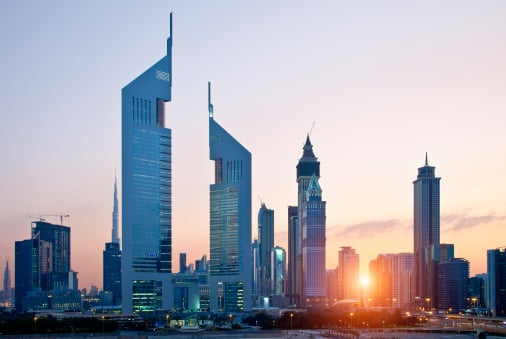Dubai Aims To Treble Tourism Income To $82bn By 2020
The emirate is likely to have more than 160,000 hotel rooms by the end of the decade.

Dubai aims to treble its annual income from tourism to Dhs300 billion ($82 billion) by 2020, which would involve doubling the number of its hotel rooms, a senior official said.
Tourism is crucial to Dubai’s economy, which had a gross domestic product of around $90 billion last year; it supports the emirate’s large retail industry as well as its hospitality sector.
Occupancy at Dubai’s 599 hotels, which have 80,500 rooms combined, was 78 per cent in 2012 as the number of visitors rose 9.3 per cent from a year ago to 10.16 million, according to data from the Department of Tourism and Commerce Marketing (DTCM).
Helal Almarri, director-general of the DTCM, told Reuters that the emirate was likely to have more than 160,000 hotel rooms by the end of the decade and aimed to attract 20 million tourists annually by then.
Most decisions to build hotels would not be made by the Dubai government but by private companies. However, the Dubai government is active in supporting growth of the industry by providing infrastructure, marketing the emirate overseas, adjusting visa policies for visitors and expanding the network of the state-owned Emirates airline.
Saudi Arabia, India and Russia will be the main contributors to expected growth in tourist numbers, Almarri told Reuters.
“With Emirates airline and other carriers we focus very much on extending the routes to those markets,” he said.
Dubai’s main airport handled 5.85 million passengers in March, up 20.6 per cent from a year earlier, according to airport authorities.
“Airport capacity is not on our critical list of issues to worry about,” said Almarri. “We can easily put on more flights at any time.” Dubai is pressing ahead with a $7.8 billion plan to expand Dubai International Airport, and plans eventually to migrate traffic to an even bigger facility.
MIX OF HOTELS
Traditionally, Dubai has been known for five-star hotels, but more budget hotels have been built in the last few years, appealing to a wider tourist base. Almarri acknowledged this was an important trend.
“The importance in our growth is to have a mix of hotels,” he said. “Over the last five years the hotel offering in Dubai has become more diversified.”
At present, hotel guests stay for an average of 3.76 nights; hotel revenue was $5.13 billion in 2012.
Almarri said that to help increase the average length of stay, Dubai would build more entertainment facilities. Plans for several theme parks have been announced in the last few months by companies backed by the government or Dubai’s ruling family.
“I have every confidence that we will have over the next three to four years coming on line a significant number of tourist attractions which are purely entertainment-like theme parks,” said Almarri.
Having been forced to provision heavily for bad loans following the collapse of Dubai’s real estate market in 2008-2011, banks have become more prudent about financing large-scale projects. Almarri said the theme parks would be funded largely through public-private partnerships.
“Theme parks are procured rather than built in many cases, so come with their own financing packages – the rides are built elsewhere, so you will probably find that many governments around the world are encouraging exports,” he said.
